Book contents
- Frontmatter
- Contents
- Preface
- A note on primary sources
- Introduction
- 1 Town–country struggles in development: A brief overview of existing theories
- 2 Nehru's agricultural policy: A reconstruction (1947–1964)
- 3 Policy change in the mid-1960s
- 4 The rise of agrarian power in the 1970s
- 5 Organizing the countryside in the 1980s
- 6 Has rural India lost out?
- 7 The paradoxes of power and the intricacies of economic policy
- 8 Democracy and the countryside
- Appendix: Liberal trade regimes, border prices, and Indian agriculture
- Index
- Titles in the series
Preface
Published online by Cambridge University Press: 02 December 2009
- Frontmatter
- Contents
- Preface
- A note on primary sources
- Introduction
- 1 Town–country struggles in development: A brief overview of existing theories
- 2 Nehru's agricultural policy: A reconstruction (1947–1964)
- 3 Policy change in the mid-1960s
- 4 The rise of agrarian power in the 1970s
- 5 Organizing the countryside in the 1980s
- 6 Has rural India lost out?
- 7 The paradoxes of power and the intricacies of economic policy
- 8 Democracy and the countryside
- Appendix: Liberal trade regimes, border prices, and Indian agriculture
- Index
- Titles in the series
Summary
This book has been long in the making. I began working on it when political economy as an area of inquiry within political science was still new. In the mid-1980s, the leading political science departments in the United States were investing a good deal of their professional energy in developing the field. The book was completed when, several years later, political economy had stabilized itself as a field of specialization. Confronted with a rising ethnic explosion in the world, the heady enthusiasm of the early years had dissipated; and rationality as a governing principle of human behavior, though relevant, seemed more limited than was generally assumed in the 1980s. An unarticulated awareness that a field at the intersection of politics and economics must also pay attention to identities, and not simply to interests, has finally crept in. As a result, a certain mellowness is in evidence, showing signs of the emerging intellectual maturity of the field.
This book follows what has come to be called the rational-choice method without, however, accepting all the substantive assumptions of those who work in the field. The method is used first to explain why rural India has become so powerful, a development that is theoretically and historically counterintuitive. The same method is then used to show the limits on rural power. The argument in the end is that religious, caste, and ethnic identities – or at any rate noneconomic interests defined in ethnic, caste, and religious ways - are now blocking the economic construction of rural interests.
Information
- Type
- Chapter
- Information
- Democracy, Development, and the CountrysideUrban-Rural Struggles in India, pp. ix - xPublisher: Cambridge University PressPrint publication year: 1995
